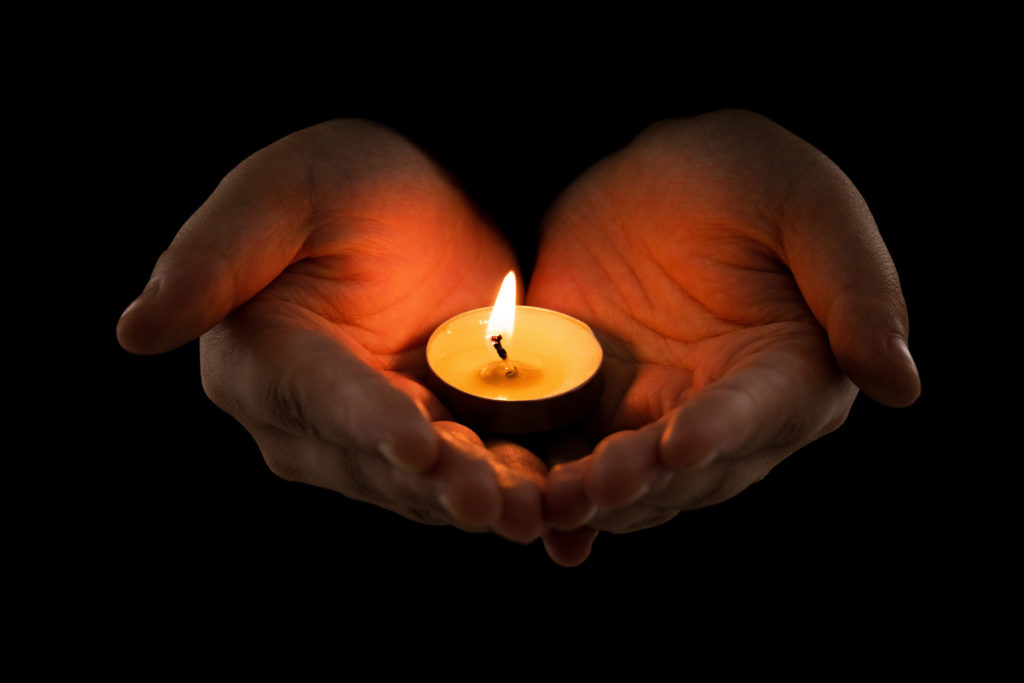
Foreword
Three thousand years ago, the Buddha told us that there is no ultimately peaceful place in this world: “There is no peace in the Three Realms; they are like a burning house.” The Buddha told us that there will be three minor calamities: war, pandemic, and famine. All three have appeared in our world today. Warnings can be found in the Buddhist sutras from long ago, about the deaths and injuries due to war, the worldwide spread of the pandemic, and the food shortages resulting from natural disasters. These are all due to the disharmony in the minds of human beings. What are the causes and conditions associated with military invasion? There are certainly reasons behind this.
Wars cause immense pain and suffering. People are separated from their loved ones, and their bodies and minds become broken. The Venerable Master Miao Lien personally experienced life during times of war and chaos. He said, “It is better to be a dog in peaceful times, than to be a human being in times of chaos.” How could people living in midst of a war compare to dogs living in times of peace? In fact, they cannot even compare to ants. Their lives are always in danger. The wars in this world have never stopped, allowing us to feel the cruelty of war even more.

THE ORIGIN OF WARS
In Buddhism, the Law of Dependent Origination states that all phenomena arise as a result of causes and conditions. Cause and effect span the Three Periods (past, present, and future). What exactly is the cause of war? At the end of the day, these retributions are caused by people. The calamities of war, pandemic, and famine are the retributions of violating the Five Precepts, committing acts of killing, stealing, and sexual misconduct. Even natural disasters are caused by the negative karma created by people. It is not that the heavenly deities want to harm us. Why would they harm us? The heavens only give us nourishment. The disasters that occur originate from our own greed, anger, and ignorance. Every cause has its corresponding effect; and the effect will always come to fruition. The cruel killing of fellow human beings that comes with war is also due to karma—karma that we have created with our mouths. “For hundreds of thousands of years, the stew in the pot has boiled up a resentment very hard to level. If you want to know why there are wars in the world, just listen to the haunting cries that come from a slaughterhouse at midnight.” These large-scale killings and wars arise according to dependent origination. They are the result of creating negative karma. Wars begin with our choice of what we put in our mouths.
If we eat one shrimp per day, that adds up to 365 shrimp in a year. If we do that for 10, 20, 30, 40, even 50 or 60 years—nowadays, human life expectancy is 70 or 80 years—how can we even begin to calculate the debt that we incur? When pigs, cows and chickens contract the flu, people are afraid of contracting their disease and slaughter them alive. So many lives have been killed; how could this world be at peace? That is impossible. How could an unwholesome cause yield a wholesome effect? When this negative karma accumulates to a certain degree, there will be war. Another reason why there are wars is the inability to practice tolerance. In the world, revenge, conflict, and hate are used to oppress others. When the hateful mind expands, its effects go from one person to the whole family, and even to the whole world, causing wars throughout the entire world.
Living together in this world, everyone should respect each other. Instead, we are jealous of others, and even want to harm them. If we are unkind to others, they will be unkind to us. If we fight with others, won’t they fight with us as well? In the end, the world will be in chaos due to war. If everyone cares for and respects each other, there will be favorable weather in the world. If people’s minds are full of conflict, we fight until the end, and someone is bound to die. Such unrest in our minds generates corresponding conditions in the world. “The arising of one hateful thought opens up the door to one hundred obstructions.” In the past century, the world wars have been between the same few people. Those same few people talk it over, and if the talk goes well, everything is alright; if it does not, then… Ai! Power corrupts people. A few people decide the destiny of the majority of people. If their talks do not go well, what happens when they start to take action? Everyone can only wait and suffer the retribution. When that time comes, it will be too much to take. “A fire at the city gates brings disaster to the fish in the pond.” Wicked people cause chaos throughout the world, and good people suffer as a result. Why are there wars? They are caused by the greed, anger, and ignorance of the mind, and the karma of killing, stealing, and sexual misconduct.
HOW TO AVOID WARS
Everyone wishes to be born during peaceful times; nobody wishes for wars to occur. This is especially true since now, many countries own weapons that are powerful enough to destroy the entire world. When one hateful thought arises, the results are unimaginable. Can the modest efforts of an individual help bring the world back to peace? Let’s search for answers in the teachings of Venerable Master Miao Lien.

1. Practice Buddhism
Conflicts are rampant in this Dharma-Ending Age. If everyone believes in the Buddha, the world will be at peace, and there will not be a third world war. If everyone does not believe in the Buddha, there will not only be a third world war, but a fourth and fifth as well. If everyone believes in the Buddha, they will not do unwholesome deeds. Otherwise, if we continue to fight with each other, how could the world be at peace? There is unrest in society because there is a lack of Buddhist education. If Buddhism flourishes, nations will prosper. If we want the world to be at peace, and everyone to come together as one family, we need to rely on the Buddhadharma. When one person practices Buddhism, that person will enjoy peace and happiness. When one family practices Buddhism, that family will enjoy peace and happiness. If we can expand this to the entire world, the entire world will enjoy peace and happiness. We are all human beings, and we all live on the same planet; there should not be any distinction between you and me, or among different ethnicities. This is the Buddhist perspective: why differentiate between you and me? This easily leads to problems. The limited capacity of our minds leads to differentiating between you and me. We should eliminate this narrow-mindedness, and expand the capacity of our minds. We are all brothers. We are all family. With such an openness of mind, we will live together with love and harmony. How could there still be conflicts and fights? How could there still be wars?
We should begin with ourselves as Buddhist practitioners. First of all, bring forth the Bodhi resolve to benefit others. In walking, standing, sitting or lying down, do not let go of any opportunities to courageously step forward and help others. Buddhist practitioners do not engage in conflict or revenge. When others are wrong, we are able to forgive them. We make the great resolve to do great things. It is a pity that people in the world turn away from the true nature, and misuse it by acting out of greed, anger and ignorance, resulting in wars. If we turn this around and practice according to precepts, concentration and wisdom, then this is “transforming from ordinary into a sage.” This is not dream; it is an ideal. As long as you practice precepts, concentration and wisdom, it will be realized. The world is full of revenge and conflict, resulting in wars and killing of each other. Buddhism is about peace, compassion, and tolerance. If everyone practices Buddhism, the world will be at peace, and the mundane world will transform into a Buddha Land. People tend to be confrontational. We need to soften this tendency with the compassion of Buddhism, just as you would moisten ammunition with water. Everyone is subject to greed and desire. We need to dissolve it with the wisdom of Buddhism, just as you would apply oil to the outside of a bucket to make it smooth and not sticky. In the same way, ignorance needs to be dissolved with the radiance of Buddhist wisdom.
HOW TO AVOID WARS

2. Uphold the Precepts
Buddhists should take the Three Refuges, uphold the Five Precepts, and maintain strict etiquette. This is the first step to benefiting ourselves and others. Cultivating the Ten Wholesome Deeds guarantees rebirth in the heavens. Upholding the Five Precepts guards our bodies and mouths, maintains the human form and rebirth in the next life as a good person. One person upholds the Five Precepts, and that person will enjoy peace and happiness; an entire family upholds the Five Precepts, and the entire family will be at ease. If the entire world upheld the Five Precepts, how could there be wars? People in the world say, “It is unforgivable if someone kills my father,” implying that if someone does not take revenge on his father’s behalf, he is not fit to be called a human being. The Buddhist sutras say, “One must not take revenge, even for the killing of one’s father.” Buddhism is about peace, compassion, and tolerance. If everyone were to practice Buddhism, the world would be at peace; how great would that be!
If you kill my father, and I kill yours since I am obligated to take revenge, when will the killing end? Buddhist teachings say to not kill and not steal. If everyone were to practice Buddhism, there would not be killing and stealing. If everyone did not kill and did not steal, wouldn’t the world be at peace? Many conflicts are due to killing and stealing. Initiating wars to invade others—isn’t that robbery? If everyone followed the law, and did not seek after unethical wealth, refraining from killing and stealing, how great would that be! How peaceful and safe would the world be!
The Five Precepts pertain only to the body and mouth. If we gradually advance to the Bodhisattva Precepts, the emphasis is on the karma of the mind. In fact, if your body and mouth are pure, your mind will also be pure. If your mind is not pure, of course it will influence your body and mouth; they are all interrelated. Therefore, we need to be virtuous in our bodies, mouths, and minds. If we are able to uphold the Five Precepts and Ten Wholesome Deeds, we will be reborn in the human or heavenly realms. Just by following the Five Precepts outlined in the Buddhist teachings, our minds will be peaceful and quiet, without afflictions, desires, and conflicts. There will only be peace and harmony.
HOW TO AVOID WARS

3. Adopt a vegetarian diet
As a Buddhist practitioner, we need to change another type of negative karma that we create with our mouths: that is, what we put into our mouths every day. If you eat one fish today, and one shrimp tomorrow, how many have you eaten in your lifetime? How many living beings are killed in the slaughterhouses in one day and one night? Who are they being killed for? They are not being killed for the butchers themselves to eat. They are being killed for the people who want to eat them—they are being killed for you. They are being killed because you want to eat them. Even though you are not personally killing them, you are telling others to kill for you. Day by day, month by month, over time, how will you endure the retribution of the negative karma? Normally, when someone praises you, you will be happy. If someone speaks badly of you, you will be unhappy. If I punch you, you will want to kick me back; either conflict or revenge will ensue. How much more so would it be when you eat the meat of other living beings; how could they not seek revenge?
If you maintain a pure vegetarian diet, you will have no part in the negative karma created in the slaughterhouses by killing living beings. In the future, if an atomic bomb lands on your head, you will not die; you do not have the negative karma. The bomb will only kill those with the associated negative karma; without negative karma, how could it kill you? There will not be an effect without a cause. This is true for negative karma, and the same can be said for positive karma as well. It is not only Buddhism that promotes vegetarianism. Mencius also said, “Hearing its voice, I cannot bear to eat its flesh; seeing it alive, I cannot bear to see it die.” Many people unknowingly think that animals are born to be eaten by us. Human beings are the most spiritual of all creatures; they have the human nature of benevolence. We are not supposed to eat other creatures; that is a confused and upside-down view. Buddhist teachings tell us to change this cruelty of the mouth.
HOW TO AVOID WARS

4. Practice forbearance
Chinese people have emphasized propriety and righteousness for thousands of years. We have promoted Confucian values and ethical ways of living. When we go out, if people scold us, do not scold them back; if people hit you, do not hit them back, just forget about it. If you must get them back, then the problem arises: they will do the same in return. When will it ever come to an end? Therefore, we should not scold others, even if we are scolded first. Even if we are in the right, we should not hit others. Even if we are hit by others, we should still practice forbearance. Those who can forbear truly have blessings and virtues; they are the truly great and knowledgeable ones. Do not compete to be the hero, for rights, and for status, over the antenna of a snail!
We need to understand why someone would scold you or hit you. It is true that at times we may have brought it onto ourselves. But why is it that sometimes, people scold or hit you for no reason? It is because they are pitiful—they are ignorant; they lack wisdom. They suffer from the illnesses of hatred and jealousy, and at times you might just happen to be there when their illness exacerbates. When you come across a crazy person like this, how can you even reason with him? Instead, you should feel sorry for him and think, “He has a problem, a sickness, and is upside-down.” We need to have a mind of great compassion, feel pity for him, and be patient with him; this is the Buddhist way of thinking. Compassion comes from having the wisdom of the Buddhadharma, and only compassion will move people and gather them in. We need to be compassionate, tolerant and magnanimous in order to subdue and gather in all sentient beings. If everyone was compassionate, the world would naturally be at peace; how could there be wars? The world would be peaceful. It is because people are unable to practice tolerance that the society is full of conflict. At the end of the day, we all suffer when the society is in conflict. An individual can influence the entire society. If everyone was virtuous and brought forth the mind of a Bodhisattva, how could there not be peace in society? How do we demonstrate the mind of a Bodhisattva? It starts with tolerance and forbearance. Forbearance can eliminate all difficulties, and all kinds of blessings and virtues are contained within this practice. If you can practice tolerance and forbearance, your body and mind will be at ease, and your appearance will be pleasant and peaceful. People will naturally be happy when they see you. If you can maintain your benevolence and compassion, then anywhere you go in the world, you will be peaceful and at ease!

Conclusion
If one person practices the Buddhadharma, that person will enjoy peace and happiness; if an entire family practices the Buddhadharma, the entire family will enjoy peace and happiness. By extension, the society and the entire world will be at peace. Now, if we want the world to be at peace, without any wars, jealousy, and obstacles, everyone needs to follow the principles, abide by the law, and practice according to the Buddha’s teachings. If everyone turns their ordinary mind around and practices the Buddhadharma, how could there be wars? If the world is free of wars, why would there be the need for national defense? If everyone acted with proper courtesy and manners, why would there be need for the police? If everyone could be charitable and virtuous, without any conflict, how peaceful and happy would they be! This can only be done with Buddhist practice and a Buddhist perspective on life. If countries did not need national defense, and we used these valuable human resources, money and time on improving the lives of citizens, and people had spiritual dialogues, supported each other in their actions, how could there be wars? If we fight with each other, what happens in the end? We kill each other and all die together. If we are grateful to each other, and everyone holds gratitude in their minds, wouldn’t this be a Pure Land on Earth? Wouldn’t that be the most peaceful life?
The Buddha told us, “There is no peace in the Three Realms; they are like a burning house, full of suffering and great fear.” In this world, violence and killing are inevitably present, making it a world full of suffering and affliction. If we are in a place where there is a drought, a war, or a pandemic, we cannot just wait to die; we need to find a way out. That is why the Buddha told us long ago that there is a Western Pure Land of Ultimate Bliss, and instructed us to chant the Buddha’s name and be reborn there. What kind of mindset should we have when chanting the Buddha’s name? A mind that seeks refuge, because there are too many disasters in this world. Do not wait until the third world war before seeking refuge. The world might be very large, but where can you run? The only thing to do is to chant the Buddha’s name to be reborn in the Western Pure Land.
